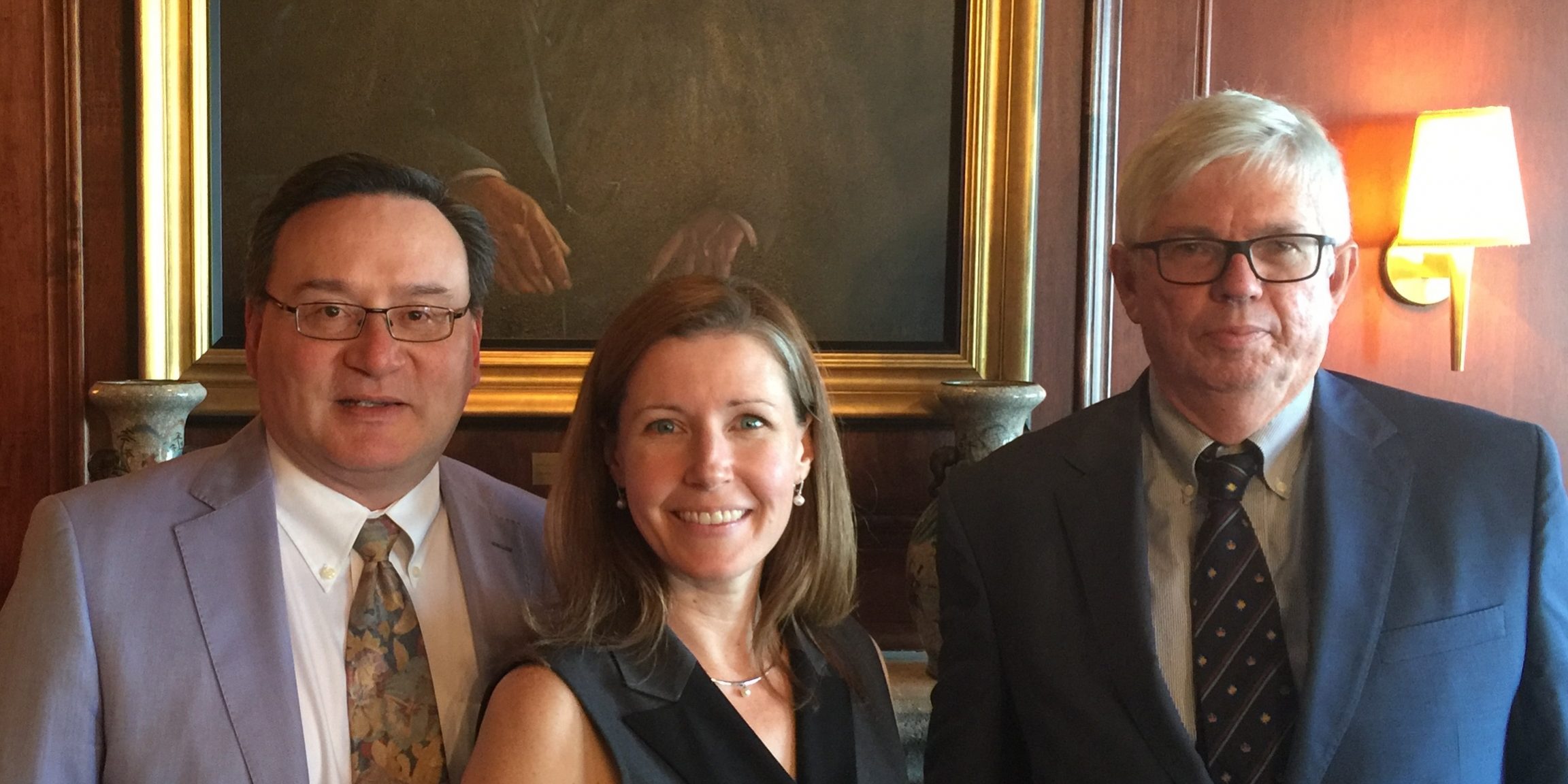IITIO’s NAFTA submission: the first to spark inclusion of Indigenous Trade among International trade partnerships
On July 14, 2017 IITIO filed submissions with Global Affairs concerning, among other things, Indigenous representation in trade negotiations and the development of an Indigenous Chapter within a revised NAFTA.
Out of 2500 submissions on suggested topics for re-opening NAFTA, IITIO’s was the only Indigenous trade submission. Our submissions were personally read by Foreign Affairs Minister Freeland. Based on our submissions, Canada took action to develop an Indigenous Chapter, appoint Perry Bellegarde, Assembly of First Nations National Chief, to the NAFTA Advisory Council for Canada, and maintain an inclusive dialogue with IITIO on the development of the Indigenous Chapter and on Traditional Knowledge impacting the Intellectual Property chapter of NAFTA.
Since the re-opening of NAFTA on or about late July, IITIO has been provided with weekly briefings by senior Global affairs staff. In July 2017 Global Affairs, led by Danielle Belanger, Director, Partnerships and Coordination, Economic Policy Development (now retired) formed the Global Affairs Indigenous Chapter Working Group (GAICWG) in which IITIO played a founding role with Global Affairs. GAICWG set informal terms of reference, a radical departure from other Global Affairs trade development groups. Like all other Foreign Affairs departments around the world, Global Affairs has in the past set up unilateral inquiries and interviews of industry experts, to allow Global Affairs policy drafters to draw up policy and trade chapters to meet the country’s needs. In the past Global Affairs policy experts and lawyers would draft in secrecy and negotiate in private. Global Affairs would invite submissions and conduct interviews with industry representatives, but Global Affairs’ policy or trade chapters were never developed collaboratively.
IITIO successfully recommended that the GAICWG include all available and interested stakeholders and rights holders. As a result, a broad‑based membership formed the GAICWG. National groups such as the Assembly of First Nations, Inuit Tapiriit Kanatami, Congress of Aboriginal Peoples, Native Women’s Association of Canada and the Metis National Council were participating members, but so were Rights‑holder organizations representing treaty holding nations and non‑treaty holding nations, as well as interested stakeholders such as the Canadian Council of Aboriginal Business, the Canadian Economic Development Officers Association (CANDO), the National Aboriginal Capital Corporations Association, Kahnawake Economic Development Commission and the National Aboriginal Capital Corporations Association. These like‑minded groups were interested in ensuring that a final draft of the proposed NAFTA Indigenous Chapter was put together on a collaborative basis, where all ideas and concerns were openly tabled and discussed by all within the working group. Global Affairs took the opening position that there were no bad ideas in the development of the Indigenous Chapter and after every weekly two hour working group discussion, Global Affairs experts would note the concerns and ideas expressed in the discussions and from these discussions the Global Affairs experts would draft details of the Indigenous Chapter that reflected the working group’s design.
The first phase of the GAICWG was to put together a draft outline, the concepts delineating the Indigenous Chapter. The outline was divided into three sections of development. General Provisions, Facilitation of Indigenous Participation in Trade, and Committee to Guide Trade and Indigenous Peoples. The next collaborative step was for Global Affairs to draft for the GAICWG a summary of the Indigenous elements that, based on the group discussion, should go in a modernized NAFTA. Part of this Indigenous element included a NAFTA Summary which explained and contextualized Canada’s larger approach to renegotiating a modernized NAFTA, which also included original traditional elements that typically go into a trade agreement such as NAFTA (intellectual property, government procurement, services and non‑conforming measures, to name a few). The Summary also explained Canada’s inclusive approach to an Indigenous Chapter in the context of NAFTA Modernization. The Summary allowed the GAICWG and Global Affairs to better understand the proper and justifiable fit that an Indigenous Chapter would have in a modernized and progressive NAFTA.
The final phase of the GAICWG was to hammer out the details of what content would go into the Indigenous Chapter and how best to ensure that all interests will be accommodated, and how Indigenous rights will not be eroded. IITIO has been involved in the development and shaping of the Indigenous Chapter. Michael Woods and Wayne Garnons‑Williams have attended and contributed to every single weekly GAICWG meeting and every NAFTA briefing and will continue to do so until the conclusion of NAFTA.
On October 6, 2017, the Chair of IITIO was invited to a NAFTA – Intellectual Property “think tank” session chaired by the Minister of Foreign Affairs, Chrystia Freeland. At this session, IITIO’s analysis of Indigenous Traditional Knowledge in relation to International Intellectual Property Law regimes was favorably accepted by Minister Freeland:
https://iitio.org/minister-global-affairs/
It would appear that the policy motivation for involving IITIO was not only the useful content of the legal analysis via the paper on Traditional Knowledge in the context of Intellectual Property but also the stated concern by Minister Freeland to not “pigeonhole” Indigenous issues within NAFTA, relegating them to the Indigenous Chapter alone. Indeed, Global Affairs welcomed input on all issues impacting Indigenous interests, ranging from Intellectual property and government procurement to dispute resolution and human resource issues. Where concerns were raised, Global Affairs took the time to listen and to read our submissions. The TK/IP policy paper of IITIO’s that was submitted to the Minister of Trade can be found at the following hyperlink:
In the end the Indigenous Chapter was a true collaborative product that the GAICWG could hand off to the Canadian NAFTA negotiating team. Proof of the success of this collaboration was the fact that while there was initial reluctance and a lack of understanding on the part of the trade negotiation teams of Mexico and the USA, after discussion and presentation of the GAICWG’s work, the US and Mexico negotiation teams agreed to sit down to negotiate content based on the Indigenous Chapter. The Indigenous Chapter itself is a reflection of the collaborative, thoughtful and inclusive approach to good policy development. The Indigenous Chapter has three core objectives:
- Recognize the important role of Indigenous peoples in trade, both historically and also in the context of facilitating sustainable growth and prosperity for Indigenous communities.
- Facilitate cooperative activities between the Parties and enhance the ability of Indigenous peoples to participate in and benefit from the opportunities created by this Agreement; and,
- Establish a committee to oversee the implementation of the chapter and consider matters of relevance to Indigenous peoples across the Agreement.
Three more significant points need to be made about the GAICWG Process:
- The government expressly acknowledged at the outset that this collaborative process could in no way be interpreted as Canada fulfilling its constitutional fiduciary obligation of consultation with Indigenous rights holders.
- This collaborative process marks a turning point for the Government of Canada. Such a level of inclusiveness and collaboration in developing trade provisions for NAFTA has never been accomplished before. Driven by Global Affairs, this process sets a “best practice” example for all other government departments (federal or provincial) to follow when developing law and policy in matters affecting Indigenous interests and rights.
- The trust between Global affairs and the stakeholder and rights‑holder members of the GAICWG was built over time; now that the Canadian draft of the Indigenous Chapter is in confidential tri‑national negotiations, the GAICWG members generally feel that the Government of Canada understands the Indigenous issues from a legal and policy perspective and will continue to negotiate in an honourable manner, maintaining the integrity of the Crown in relation to her Indigenous peoples.
This “sea-change” of protecting and anticipating Indigenous interests and rights is what the Crown should have been doing since the first Crown-Indigenous treaty was negotiated and signed so long ago. While the change in policy and process is new and refreshing it is also a manifestation and realization of the spirit and intent of the original relationship.







